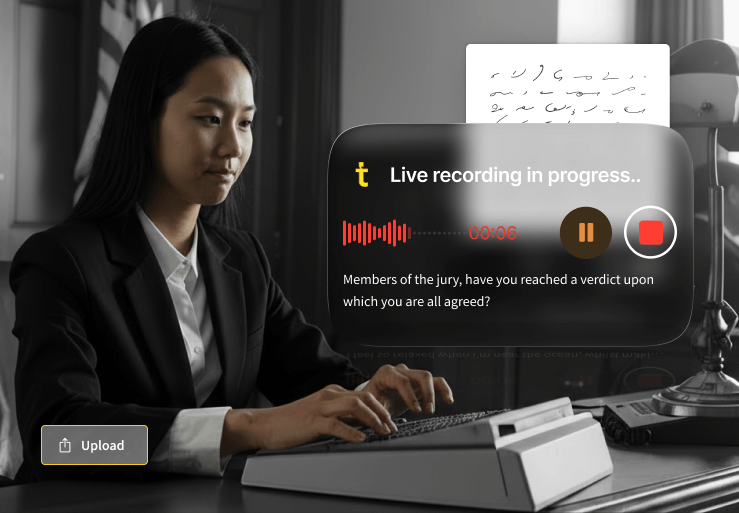
You've bought the mic, you've got a clear content schedule, but how do you get your podcast in front of the right people? You need SEO.
Search engine optimization (SEO) is exactly what it sounds like: optimizing your content for search engines and streaming platforms. By knowing how your audience is searching, you can get your podcast seen (or heard) by more people — and make more money from it. Want to know how? We'll cover everything you need to know about podcast SEO.
Create a unique name
First things first: give your podcast a unique name. Although no one is searching for it yet, when you do grow your audience, you want them to be able to find you. Aim for something catchy so that you stand out, but don't make it too creative — you want to be discoverable. A name that’s too vague or abstract can make it harder for potential listeners to stumble across you naturally.
Make sure you include your topic somewhere in the name, too, so you can be found by people searching for your type of podcast. For example, if you have a business podcast, you might want to include words like "business", "money", or "entrepreneur", to make it easier for search engines and potential listeners to find.
Do keyword research
Keywords are essential to podcast SEO. They tell you what your audience is searching for, and how they're searching for it. You can use keyword research tools like Moz Keyword Explorer, Semrush, Ahrefs, or Google Keyword Planner to generate a list of words and phrases. These will be given to you along with their search volume, which is the average number of people searching for that term within a time period (usually a month).
Performing keyword research can help in two ways:
- It gives you a clear content roadmap: If you know what your audience is searching for, you can cover those topics to answer their questions.
- It helps you name your episodes: When you know how your audience is searching for your topic (i.e. the exact phrases they're using), you can use these in your episode titles and descriptions.
You can read more about keywords in our guide to SEO for journalists.
Optimize your episode titles
Now you've got your keywords, use them in your episode titles. This way, search engines and streaming platforms know what your episode is about, and people will be able to find you.
Staying with the business podcast example, if your audience is searching for "how to start a business" you might want to cover this on your pod. Make sure your title includes the words "start" and "business".
Don't forget to name-drop your guests, too. Even if listeners don't know you yet, they might already know your guest. Once they spot that their favourite celebrity or industry figure is featured, they're more likely to hit the play button.
As with your episode titles, make sure to optimize your show descriptions and notes. Write a compelling but concise description that clearly explains what your podcast is about. Our AI summarizer can give you a headstart. Then, weave in relevant keywords to help search engines identify your content.
The notes are where you can get a little more detailed. Include as much relevant information as possible, but be careful not to 'keyword stuff' here. Only use your keywords when it would be natural to do so, rather than 'stuffing' them in any chance you get — this can actually do more harm than good to your podcast SEO!
If your show is particularly long, you might want to add timestamps too. This not only helps listeners navigate your content more easily but also makes your show more accessible and user-friendly. Timestamps also add more text for search engines to index, increasing your podcast's discoverability.
Transcribe your episodes
Search engines can’t 'hear' audio, but they can read text. That’s where transcriptions come in.
By providing a transcription, you’re giving search engines something to crawl and index, increasing your chances of ranking for relevant keywords. For example, including transcriptions with keyword-rich text can help your podcast episodes rank for specific topics like "how to start a business" or "marketing strategies."
Transcriptions also make your podcast more user-friendly and accessible. By having a written version of your audio, those who are Deaf or hard of hearing, or even those who prefer reading over listening, can still engage with your content. It’s a simple way to make your podcast more inclusive — another key SEO ranking factor.
With transcription software like Trint, you can transcribe podcast audio into a fully editable document with up to 99% accuracy in just a few clicks, saving you hours of manual work. Then, pull out viral snippets and sound bites or shape into blog posts, social media posts and previews, or even ebooks.
Want to learn more? Check out how Trint can help podcasters improve their workflow and take advantage of our 7-day free trial.
Upload your podcast to various platforms
Submit your show to major platforms like Apple Podcasts, Spotify, and Google Podcasts to maximise your reach. Each platform has its own search algorithm that ranks content based on factors like relevance, engagement, and listener behavior.
Want to up your engagement? Encourage listeners to leave reviews and ratings to boost engagement signals. Having a regular publishing schedule can also boost your visibility, as platforms often favor active and consistently updated shows.
How often you post can depend entirely on your audience and niche, but our research revealed that US listeners prefer daily or very frequent episodes, while the UK and Canada are happy with a couple of posts per week.
Create a podcast website
Finally, don't skip the website. Having a dedicated podcast site can help you rank on Google Search alongside streaming platforms. It's also the best place to host your transcripts, show notes, merch, and premium content. Plus, a website gives you a central hub for branding, collecting email subscribers, and linking to all streaming platforms, making it easier for new listeners to find and follow your show.
Again, don't forget to optimize your website using relevant keywords in your podcast description, show notes, and blog-style summaries to boost your rankings in Google Search results.
If you want to make sure your content is reaching the right audience, you need SEO for your podcast. By incorporating these SEO tactics into your strategy you can boost your discoverability and grow your listener base.
Trint makes this even easier by turning your podcast audio into high-quality, searchable transcripts in just minutes. With accurate transcription, you can create SEO-friendly show notes, blogs, and social content — without the extra hassle. Take advantage of our 7-day free trial or book a demo with our team and see how Trint can power up your podcast.

DON'T take our word for it
Download our eBook, Telling Stories Faster With Trint, and hear how Trint is making content creation faster, easier and, most importantly, painless for newsrooms across the world.
Download








